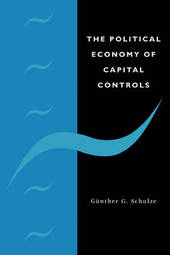
|
The Political Economy of Capital Controls
Paperback / softback
Main Details
| Title |
The Political Economy of Capital Controls
|
| Authors and Contributors |
By (author) Gunther G. Schulze
|
| Physical Properties |
| Format:Paperback / softback | | Pages:300 | | Dimensions(mm): Height 229,Width 152 |
|
| Category/Genre | Political economy
Public finance |
|---|
| ISBN/Barcode |
9780521142854
|
| Classifications | Dewey:336.39 |
|---|
| Audience | | Professional & Vocational | |
|---|
| Illustrations |
Worked examples or Exercises
|
|
Publishing Details |
| Publisher |
Cambridge University Press
|
| Imprint |
Cambridge University Press
|
| Publication Date |
10 June 2010 |
| Publication Country |
United Kingdom
|
Description
Although globalisation is seen by many as the key economic trend, restrictions on international capital movements remain the norm in international finance. In 1996, 144 out of 186 countries maintained capital controls (IMF). Yet the vast majority of economists object to most controls on capital movement, arguing that they distort the allocation of capital and allow opportunities for fraud. What leads governments to impose restrictions on international capital movements? In this study of capital controls, Gunther Schulze uses a public choice model to explain this behaviour. He considers the many aspects of capital controls, including: quantitative measurements of capital controls, evasion, misinvoicing, the interaction between an investigating government and an evader, and the role capital controls play in helping governments meet their macroeconomic objectives. In addition to the theoretical and policy discussions the book also contains a comprehensive survey of the existing literature.
ReviewsReview of the hardback: 'Gunther Schulze covers a wide range of theories on the motivations for capital controls and why they might fail. His eclectic work encompasses models of taxation drawn from real trade theory as well as from international money and finance. Always, the political-economic motivations of governments restricting capital flows, and the likely welfare consequences, get centre stage. A welcome consolidation and analytica elaboration of hitherto diffused writings in a most important area of international development.' Ronald McKinnon, Stanford University Review of the hardback: 'This book provides a welcome analysis of international capital controls to complement the political-economy view of international trade policies. Traditional efficiency-related reasons for capital controls are examined and are found to be less effective in explaining observed policies than distributional consequences of capital movements. An extensive range of theoretical and empirical issues is investigated, including illegal avoidance and measurement of the effectiveness of capital controls. Throughout there is no presumption that, if a government has imposed capital controls, it must necessarily have done so in the best interests of society at large. Gunther Schulze has provided a comprehensive study of a topic that has not previously benefited from the insights of a political-economy perspective.' Arye L. Hillman, Bar-Ilan University, Israel
|